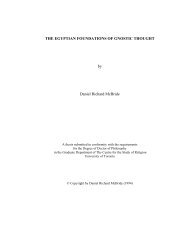Create successful ePaper yourself
Turn your PDF publications into a flip-book with our unique Google optimized e-Paper software.
o<strong>the</strong>r <strong>of</strong> that would enjoy an equally enormous<br />
in <strong>the</strong> Western Europe since <strong>the</strong> 15th century onwards. In this article we<br />
look into <strong>the</strong> this infamous magical and its 'nt'"n,.,."t",<br />
in <strong>the</strong> modern world.<br />
The Origin <strong>of</strong> <strong>the</strong> and Ancient View on<br />
Demonology<br />
The word Goetia derives from <strong>the</strong> Greek term which was <strong>the</strong> art <strong>of</strong><br />
calling-upon <strong>of</strong> evil demons and was related to ancient practice <strong>of</strong>,<br />
necromancy. The etymology <strong>of</strong> Goeteia is also related to <strong>the</strong> roots<br />
("sorcerer," goetes) and goos ("mourning song"), or goao<br />
song <strong>of</strong> Goeteia might have received its name from <strong>the</strong><br />
<strong>of</strong> <strong>the</strong> dead which dwelled around <strong>the</strong> tombs, <strong>the</strong> gooi and thrmoL It was '<br />
<strong>the</strong> art associated with <strong>the</strong> raising <strong>of</strong> <strong>the</strong> dead, a summoning <strong>of</strong> a dead ,<br />
<strong>the</strong> invocation <strong>of</strong> <strong>the</strong>ir names, and it was believed that <strong>the</strong> name<br />
from <strong>the</strong> lamentations <strong>of</strong> people around <strong>the</strong> grave. Hence its,<br />
association with 1/ groaning, wailing" as it was by Aleister<br />
Crowley when he his famous work, The Book <strong>the</strong> Goetia al l<br />
Solomon <strong>the</strong> King in 1904, with a complete catalogue seventy-two demons J<br />
<strong>of</strong> <strong>the</strong> Let us, however, return for a while to <strong>the</strong> ;<br />
ancient associations with necromancy. In Greek literature we <strong>of</strong>ten !<br />
encounter which account for <strong>the</strong> role <strong>of</strong> <strong>the</strong> goes, "<strong>the</strong> '<br />
mourner" as person who <strong>the</strong> <strong>the</strong> ei<strong>the</strong>r to<br />
information from <strong>the</strong> deceased person or to lay <strong>the</strong> spirit in peace. These .<br />
conjurations were by means <strong>of</strong> and lamentations. In<br />
Aeschylus's Persians <strong>the</strong> ghost <strong>of</strong> Darius is summoned with high shrieks<br />
and mourning lamentations. In <strong>the</strong> same fashion <strong>the</strong> ghost <strong>of</strong> Achilles is<br />
evoked at his in Sophocles' Polyxena. Also Plato <strong>of</strong> a power<br />
pu:,�:;:;t::u over <strong>the</strong> souls <strong>of</strong> o<strong>the</strong>r people. And such references<br />
might be in many o<strong>the</strong>r sources too. There are that <strong>the</strong><br />
powers <strong>of</strong> <strong>the</strong> goes might have been even greater than resurrecting <strong>the</strong> dead<br />
and with <strong>the</strong>m. He was a shaman who made an ecstatic<br />
<strong>the</strong> soul <strong>of</strong> a dead person to <strong>the</strong> underworld with<br />
magical lamentations and performing also <strong>the</strong> role <strong>of</strong> <strong>the</strong><br />
psychopomp. 61<br />
61 Daniel Ogden: Greek and Roman Necromancy<br />
- 90 -










